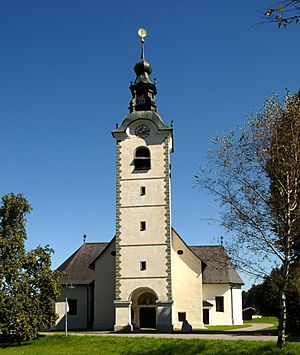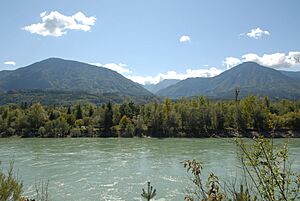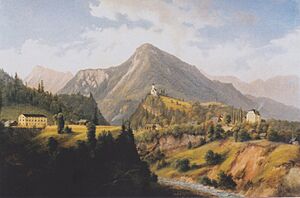Feistritz im Rosental facts for kids
Quick facts for kids
Feistritz im Rosental
Bistrica v Rožu
|
||
|---|---|---|

St John parish church
|
||
|
||
| Country | Austria | |
| State | Carinthia | |
| District | Klagenfurt-Land | |
| Area | ||
| • Total | 71.73 km2 (27.70 sq mi) | |
| Elevation | 549 m (1,801 ft) | |
| Population
(2018-01-01)
|
||
| • Total | 2,506 | |
| • Density | 34.937/km2 (90.485/sq mi) | |
| Time zone | UTC+1 (CET) | |
| • Summer (DST) | UTC+2 (CEST) | |
| Postal code |
9181
|
|
| Area code | 04228 | |
| Website | www.rosengemeinde.at | |
Feistritz im Rosental (which is Bistrica v Rožu in Slovene) is a market town in Austria. It is located in the state of Carinthia, within the Klagenfurt-Land district. People often call it simply Feistritz.
Contents
Geography of Feistritz
Feistritz is found in the Rosental valley. This valley is shaped like a "U" and is located along the Drava river. To the south, you can see the Karawanks mountain range. The valley got its name from the noble family of Ras, who built Rosegg Castle around the year 1200.
This area has traditionally been home to the Carinthian Slovenes. The Karawanks mountains also form the border between Austria and Upper Carniola, which is part of Slovenia.
The town's area stretches from the Drava river up to Mt. Stol. This mountain, also known as Hochstuhl, is the highest peak in the Karawanks range. It stands at 2,236 meters (7,336 feet) tall. You can reach it through a high valley called Bärental.
Feistritz im Rosental includes several smaller areas or villages. These are Feistritz (Bistrica), Gansdorf, Hundsdorf (Podsinja vas), Matschach (Mače), Suetschach (Sveče), and Weizelsdorf (Svetna vas).
History of Feistritz
Feistritz has a long history of working with iron. People started processing iron ore here at least as early as the 1500s. Later, mines in the Bärental area provided raw material. This material was used to make steel wire, which was important for early telegraph systems.
In 1840, during the start of the industrial age, a large factory called a rolling mill was built. This factory shaped metal. Later, in 1938, a new main employer came to town: a factory that made car batteries. This factory was called Bären-Batterie. It continued making batteries until 1998, when production stopped.
The current municipality (local government area) was created in 1850. It was first called Suetschach. In 1973, it joined with the nearby village of Weizelsdorf. Then, in 1996, Feistritz was given the special status of a market town.
In 1920, there was a vote called the Carinthian Plebiscite. People in Carinthia voted on whether to join Austria or the Kingdom of Serbs, Croats and Slovenes (which later became Yugoslavia). In Feistritz, most people (55%) voted to join the Kingdom of Serbs, Croats and Slovenes.
Population and Languages
According to a census from 2001, about 13.3% of the people living in Feistritz are Carinthian Slovenes. In the early 1900s, almost everyone in the area spoke the local Slovene language. This language remained very common even after WWII. However, over time, more people started speaking German, which is called a language shift.
The municipality of Feistritz im Rosental is made up of eight villages:
| Village | Number of people 1991 | Percent of Slovenes 1991 | Percent of Slovenes 1951 |
|---|---|---|---|
| Hundsdorf / Podsinja vas | 157 | 14.6% | 81.5% |
| St.Johann i.R. / Šentjanž v R. | 279 | 42.3% | 84.5% |
| Matschach/Mače | 114 | 16.7% | 77.5% |
| Suetschach/Sveče | 574 | 13.4% | 57.7% |
| Rabenberg / Šentjanške Rute | 24 | 45.8% | 92.5% |
| Feistritz i R. / Bistrica v Rožu | 1054 | 6.7% | 16.4% |
| Bärental/Zavrh | 21 | 0% | 77.3% |
| Weizelsdorf / Svetna vas | 323 | 5.3% | 45.4% |
Notable People from Feistritz
Several well-known people were born or lived in Feistritz:
- Andrej Einspieler (1813-1888) was a Slovene politician and editor.
- Valentin Inzko (born 1949) is a diplomat. He was born in Suetschach, where he lives with his wife, Bernarda Fink (born 1955), who is a famous singer.
- Tomaz Druml (born 1988) is a Nordic skier.
- The sculptor France Gorše (1897-1986) was from a nearby village. He lived in Suetschach and opened an art studio there in 1974, which you can visit today.
- The politician and former Carinthian governor Jörg Haider (1950-2008) also lived in Bärental.
See also
 In Spanish: Feistritz im Rosental para niños
In Spanish: Feistritz im Rosental para niños
 | Sharif Bey |
 | Hale Woodruff |
 | Richmond Barthé |
 | Purvis Young |





